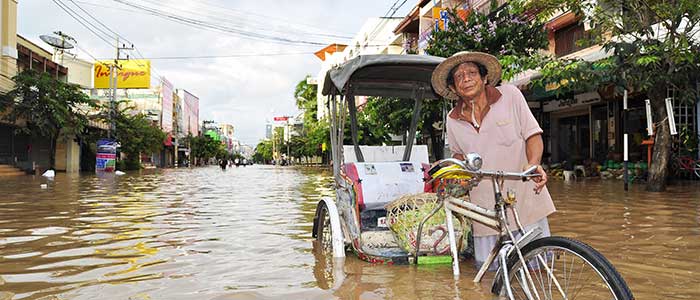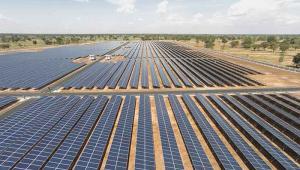Web_WomanInFlood_shutterstock_86773111.jpg

Developing countries are the least responsible for climate change occurring, and also the most vulnerable to its effects.
Ahead of an annual global climate conference kicking off in Marrakesh next week (known as COP22), the NGO analysed the $41bn annual sum that advanced economies report to have delivered to developing nations to help them prevent and adapt to climate change.
It based this analysis on what the NGO believes should count towards climate finance – definitions that vary wildly from those used by donors.
In Oxfam’s terms, advanced economies have delivered between $11-21bn worth of climate cash to poorer nations, shaving at least half off the donors’ claimed annual average.
Of that, Oxfam said somewhere between $4-8bn was earmarked to help countries adapt to the effects of climate change – far short of the $500bn per year the United Nations expects could be needed by 2050.
“Climate change is already hitting people,” said Isabel Kreisler, Oxfam International’s climate change expert. “Droughts have killed crops; sea level rise has destroyed homes. These kinds of climate shocks, combined with a ‘super’ El Niño, have left around 60 million people facing hunger this year alone.
“The people most vulnerable to these effects are the least responsible for causing climate change. They need help to adapt to their new reality, but are not getting it at the scale needed.”
Because of the developed world’s historic responsibility for emissions and their effects, to which developing nations are much more susceptible, the world’s advanced economies have promised to deliver $100bn in climate finance to poorer nations by 2020.
This is a pledge dating back to 2009, although it was reaffirmed at the annual global climate conference held in Paris last December, where an unprecedented 195 countries agreed to a landmark deal to prevent catastrophic climate change.
Since 2009, estimates of progress toward the $100bn have varied wildly. A study led by the OECD published in the run up to COP21 in Paris last year put the 2013/14 figure at $57bn.
The Indian ministry of economic affairs however dubbed these estimates as “deeply flawed”, positing the true figure could instead be as low as $2.2bn.
There is even a $10bn gap within Oxfam’s own estimations – pointing to just how tricky climate finance can be to pin down.
Not even the United Nations body dedicated to tracking climate finance, the UNFCCC, has a firm definition of what counts, and even donors can’t agree among themselves. Japan, for example, argues funds for clean coal projects should be included.
In line with the stance of other climate justice advocates, Oxfam included only the concessional element of loans or non-grant instruments in its analysis. Donor countries, on the other hand, consider market-based loans – which they will later profit from – to be permissable.
Oxfam also believes the approaches used to determine the value of investments that are only in part climate-related “lacks rigour” and the climate-relevance of some projects is therefore “overstated”.
Kreisler called on global governments to maintain the sense of urgency at COP22 this year and guarantee those on the front lines of climate change get the support they are entitled to. The world must also ensure emissions fall faster than they are now, she added.
A study published by the UN Environment Programme today found that with government’s current commitments to emissions reductions alone, the world is likely to see temperatures rise by 3°C – compared with the 2°C agreed in Paris last year.
The report found that by 2030 emissions were likely to reach between 54 and 56 gigatonnes of carbon dioxide per year. It is thought warming will exceed 2°C when emissions hit 42 gigatonnes.













